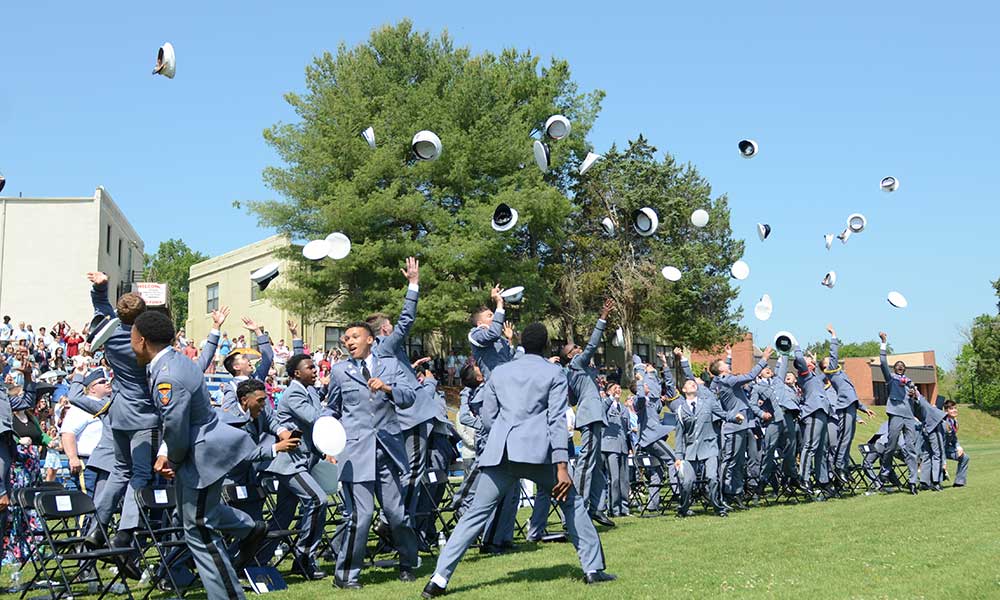
The mission of the College Placement and Academic Services team at Fork Union Military Academy is to empower and support our cadets in achieving their academic, personal, and career aspirations. Our aim is to inspire our cadets to explore their potential, pursue their passions, and successfully navigate the path to higher education, fulfilling careers, and meaningful contributions to society.
We invite you to review this list of colleges and universities to which our cadets have been accepted in the past five years.
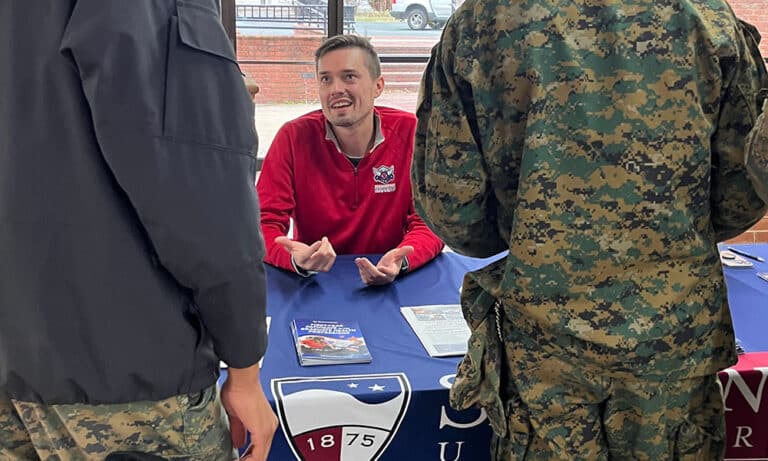 A representative from Shenandoah University visits with cadets on the Fork Union campus.
A representative from Shenandoah University visits with cadets on the Fork Union campus.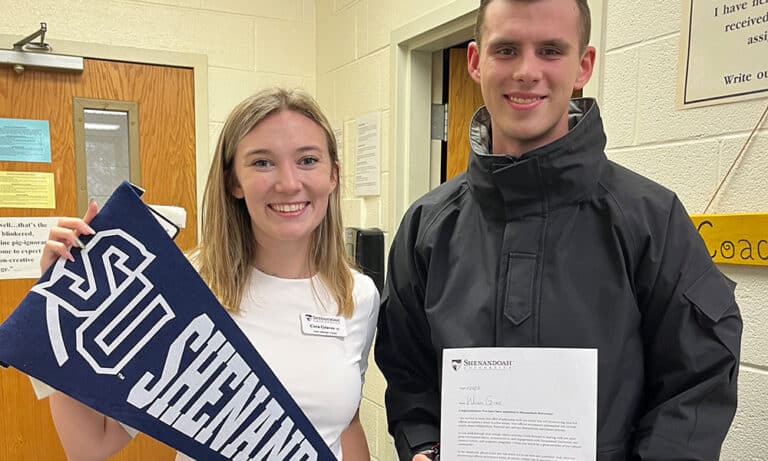 A cadet is accepted to Shenandoah University during a visit by school representatives to the Fork Union campus.
A cadet is accepted to Shenandoah University during a visit by school representatives to the Fork Union campus. Cadets visit the Luck Stone quarry for a shadow day.
Cadets visit the Luck Stone quarry for a shadow day.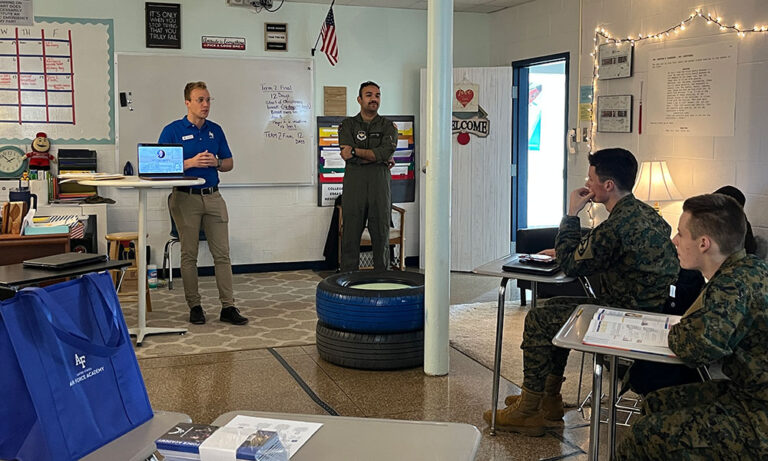 US Air Force Academy and US Air Force ROTC representatives meet with interested cadets on the Fork Union campus.
US Air Force Academy and US Air Force ROTC representatives meet with interested cadets on the Fork Union campus. Cadets learn from Luck Stone employees during an occupational shadow day.
Cadets learn from Luck Stone employees during an occupational shadow day.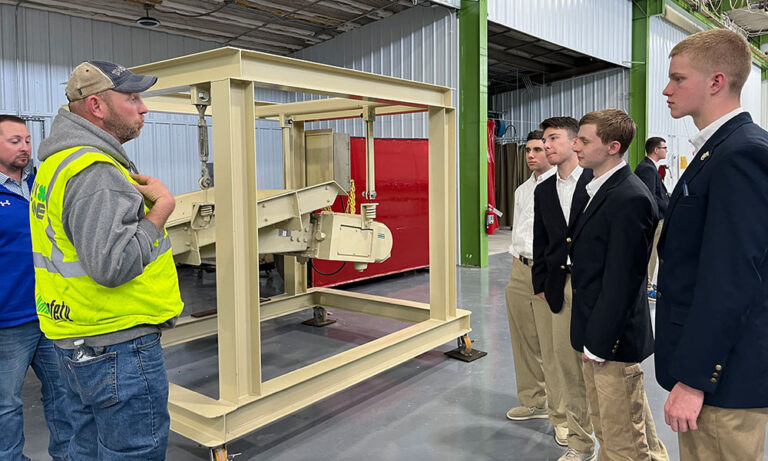 Employees of Luck Stone share with Fork Union cadets on a career shadow day visit to the quarry.
Employees of Luck Stone share with Fork Union cadets on a career shadow day visit to the quarry.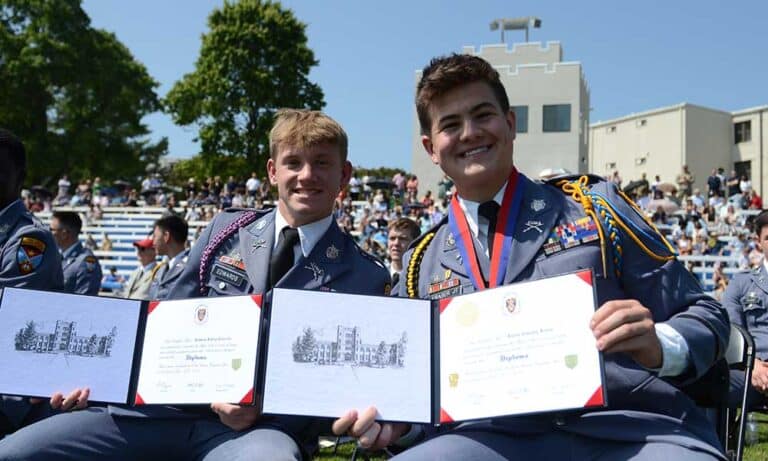 Cadets celebrate receiving their high school diplomas at Fork Union Military Academy's Class of 2023 graduation ceremony in June 2023.
Cadets celebrate receiving their high school diplomas at Fork Union Military Academy's Class of 2023 graduation ceremony in June 2023.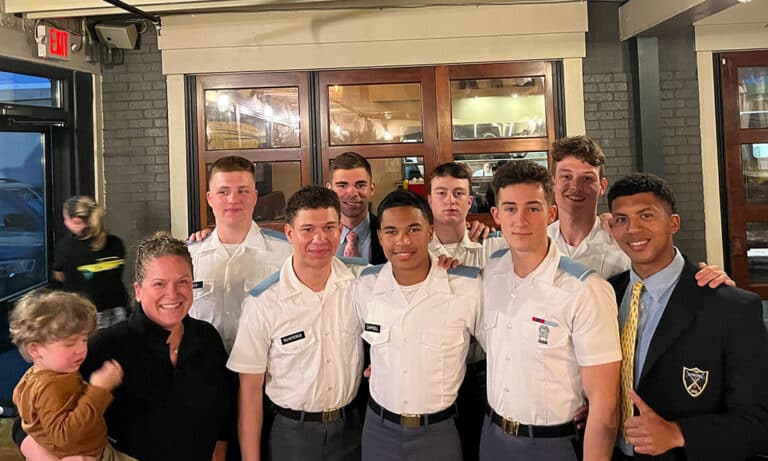 Cadets enjoyed dinner with Fork Union alumni currently attending The Citadel.
Cadets enjoyed dinner with Fork Union alumni currently attending The Citadel. A shadow day at Luck Stone gives cadets insights into career opportunities.
A shadow day at Luck Stone gives cadets insights into career opportunities.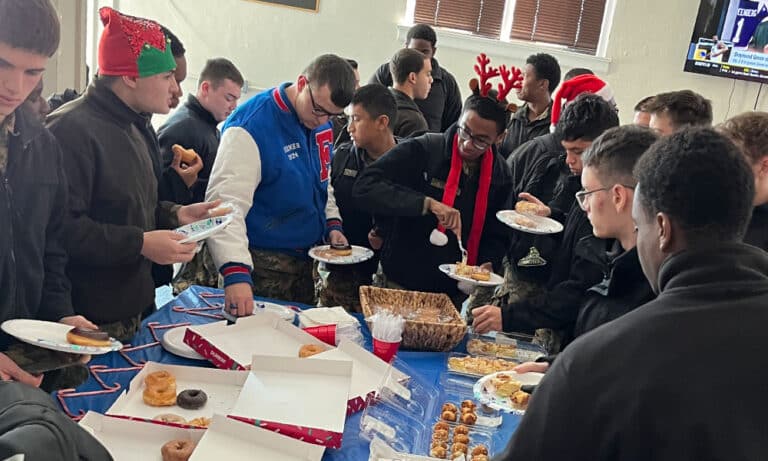 A celebratory breakfast for senior during the Christmas holiday season.
A celebratory breakfast for senior during the Christmas holiday season.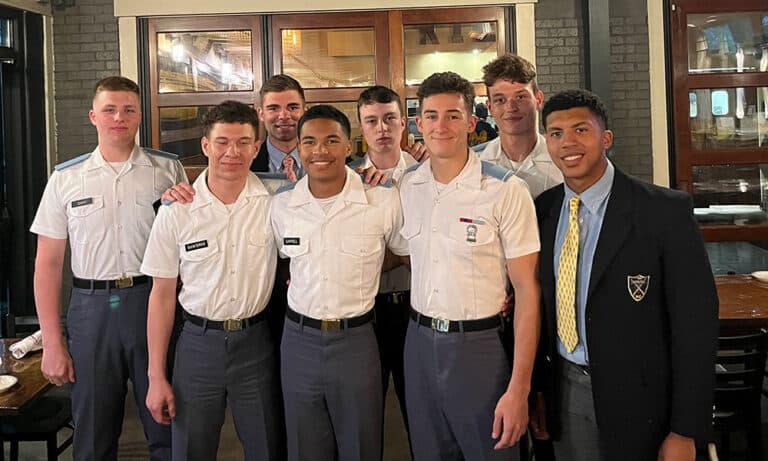 Cadets enjoyed dinner with Fork Union alumni currently attending The Citadel.
Cadets enjoyed dinner with Fork Union alumni currently attending The Citadel.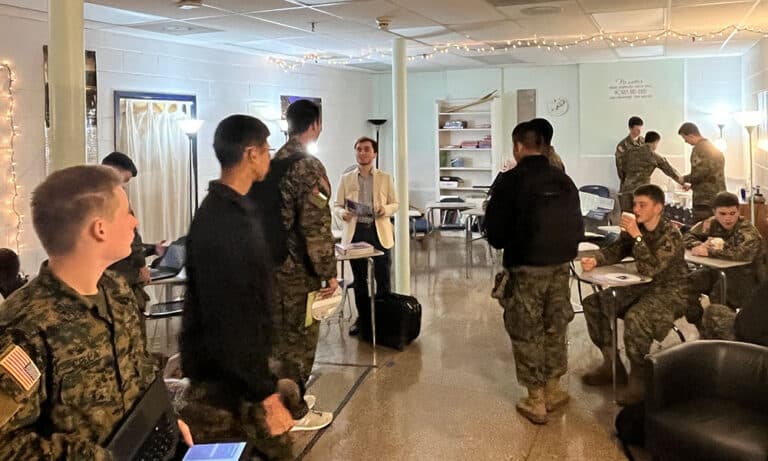 A representative from Christopher Newport University visits with cadets on the Fork Union campus.
A representative from Christopher Newport University visits with cadets on the Fork Union campus. An ROTC representative from the University of Virginia meets with an interested cadet on the Fork Union campus.
An ROTC representative from the University of Virginia meets with an interested cadet on the Fork Union campus.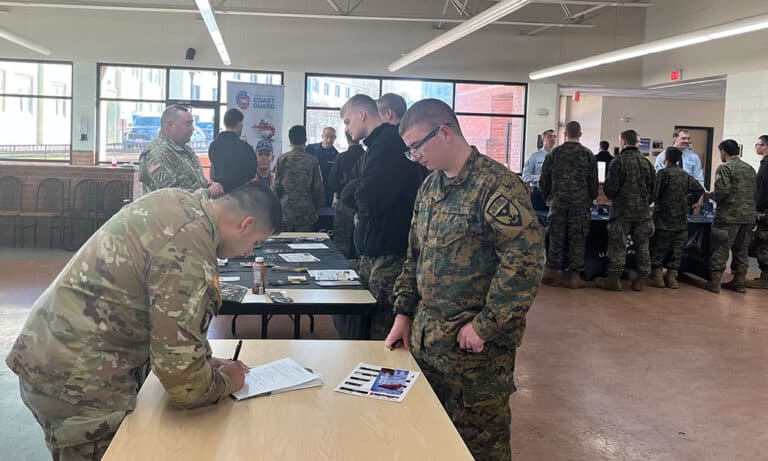 Cadets visit with military recruiters at an on-campus event to learn more about military service.
Cadets visit with military recruiters at an on-campus event to learn more about military service.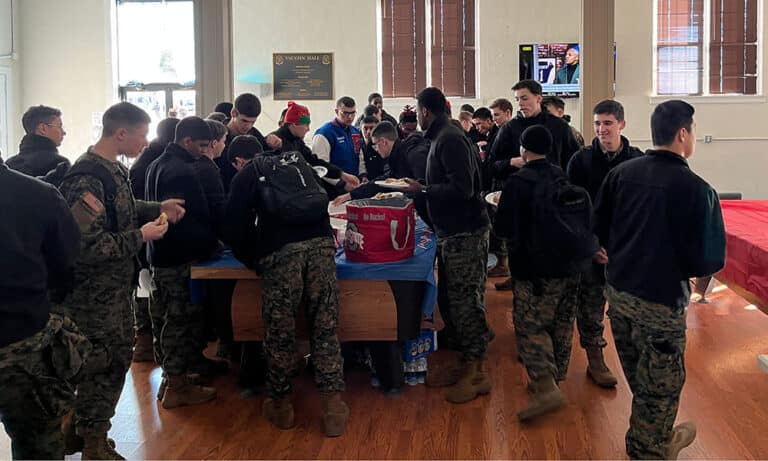 Seniors gather for a celebratory breakfast prior to Christmas Leave.
Seniors gather for a celebratory breakfast prior to Christmas Leave. Cadets learn more about Luck Stone during a shadow day visit to learn about career opportunities.
Cadets learn more about Luck Stone during a shadow day visit to learn about career opportunities.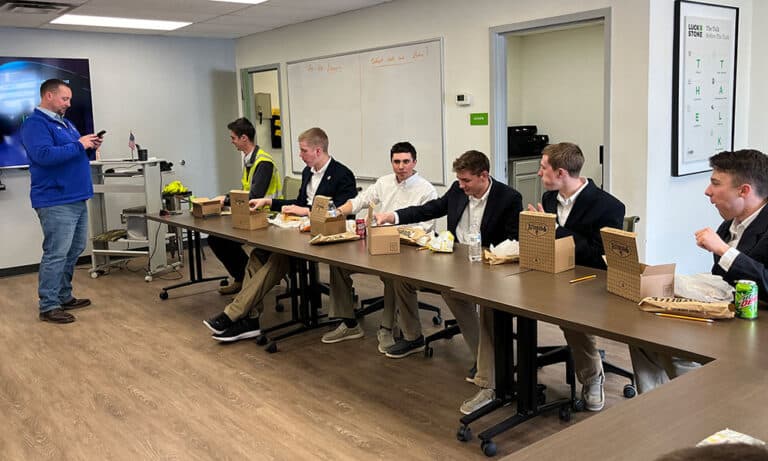 Cadets learn more about Luck Stone during a shadow day visit to learn about career opportunities.
Cadets learn more about Luck Stone during a shadow day visit to learn about career opportunities.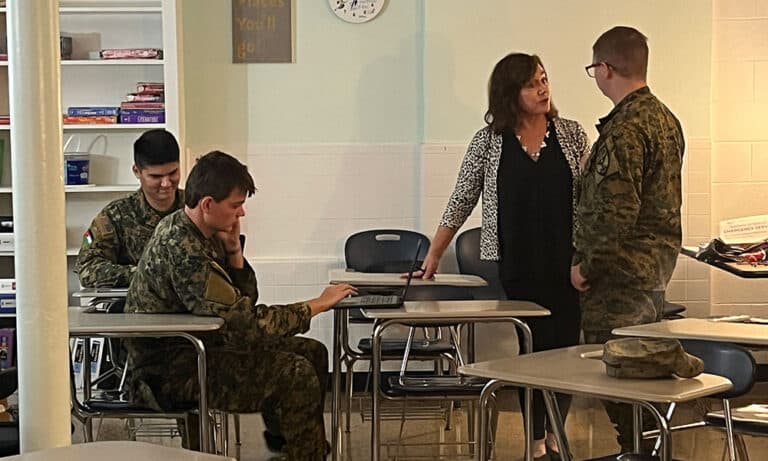 Cadets meet with a University of Virginia ROTC representative on the Fork Union campus.
Cadets meet with a University of Virginia ROTC representative on the Fork Union campus.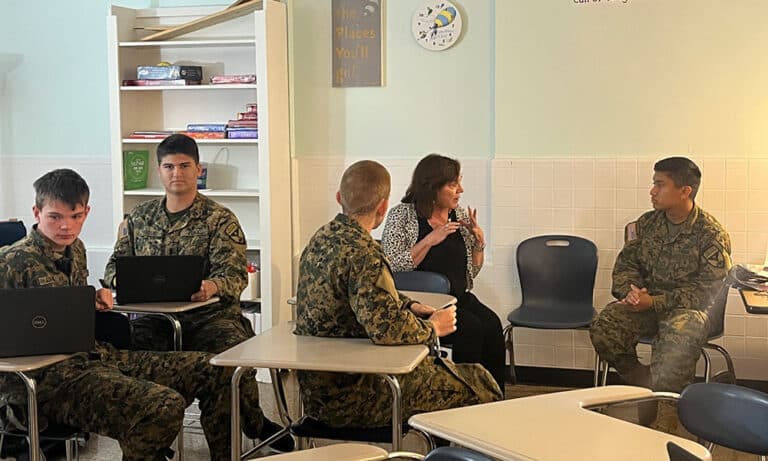 Cadets meet with a University of Virginia ROTC representative on the Fork Union campus.
Cadets meet with a University of Virginia ROTC representative on the Fork Union campus.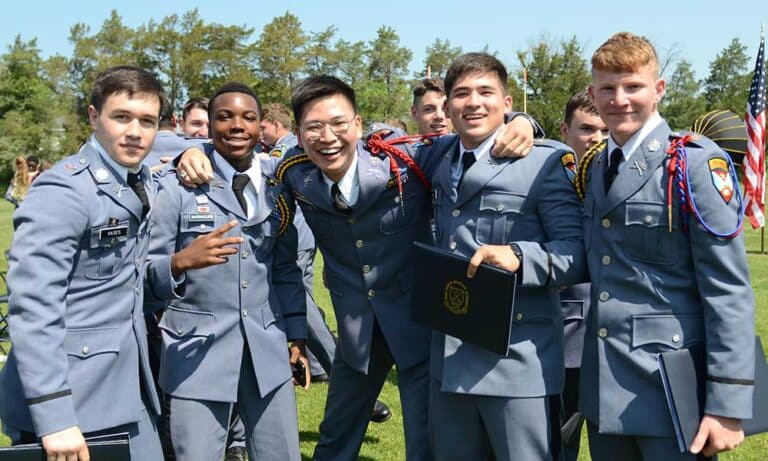 Cadets celebrate receiving their high school diplomas at Fork Union Military Academy's Class of 2023 graduation ceremony in June 2023.
Cadets celebrate receiving their high school diplomas at Fork Union Military Academy's Class of 2023 graduation ceremony in June 2023. Cadets enjoy a visit to Luck Stone on a shadow day visit.
Cadets enjoy a visit to Luck Stone on a shadow day visit.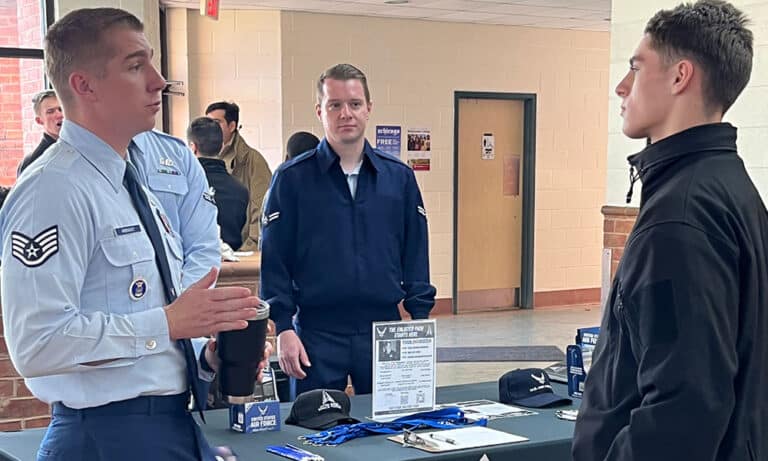 US Air Force representatives meet with cadets during a military recruiters event on the Fork Union campus.
US Air Force representatives meet with cadets during a military recruiters event on the Fork Union campus. Cadets learn more about career opportunities during a shadow day visit to Luck Stone.
Cadets learn more about career opportunities during a shadow day visit to Luck Stone. Cadets learn more about career opportunities during a shadow day visit to Luck Stone.
Cadets learn more about career opportunities during a shadow day visit to Luck Stone.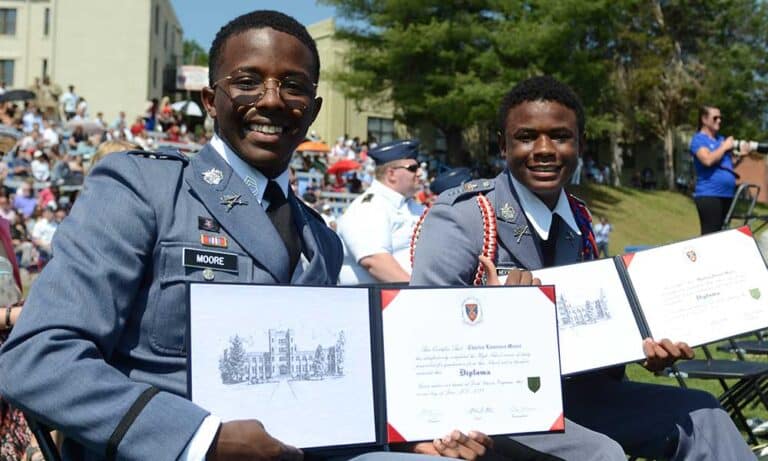 Cadets celebrate receiving their high school diplomas at Fork Union Military Academy's Class of 2023 graduation ceremony in June 2023.
Cadets celebrate receiving their high school diplomas at Fork Union Military Academy's Class of 2023 graduation ceremony in June 2023.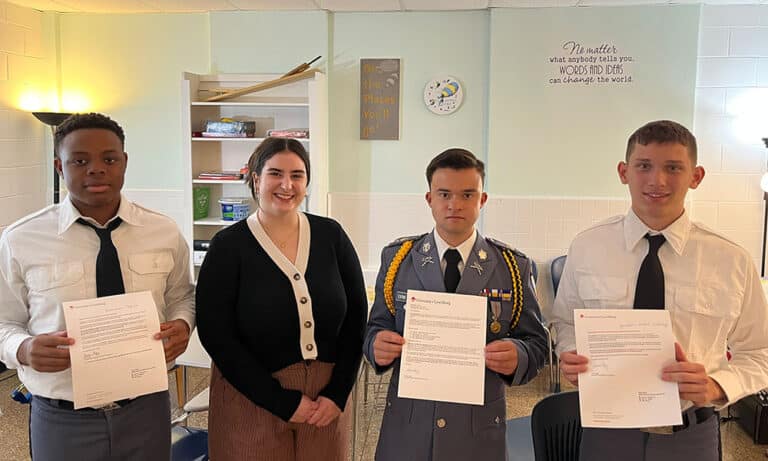 A representative of the University of Lynchburg offered immediate direct admission to Fork Union cadets on a visit to the FUMA campus.
A representative of the University of Lynchburg offered immediate direct admission to Fork Union cadets on a visit to the FUMA campus.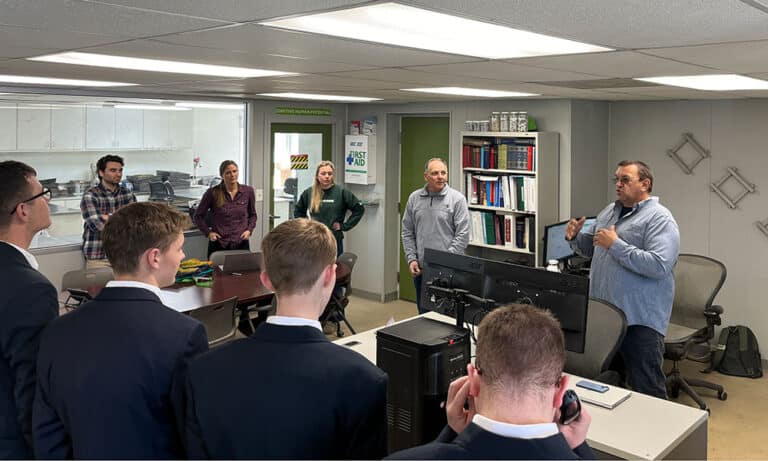 Cadets visit the Luck Stone quarry for a shadow day.
Cadets visit the Luck Stone quarry for a shadow day.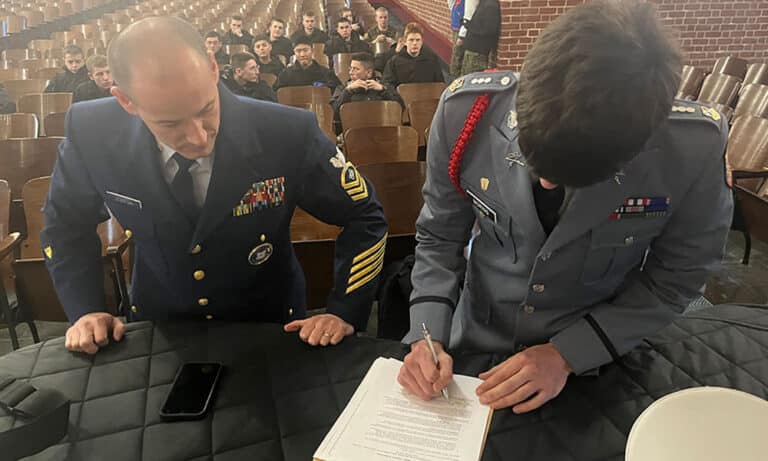 Cadet Moring swears into the US Coast Guard at a special event on the Fork Union campus.
Cadet Moring swears into the US Coast Guard at a special event on the Fork Union campus.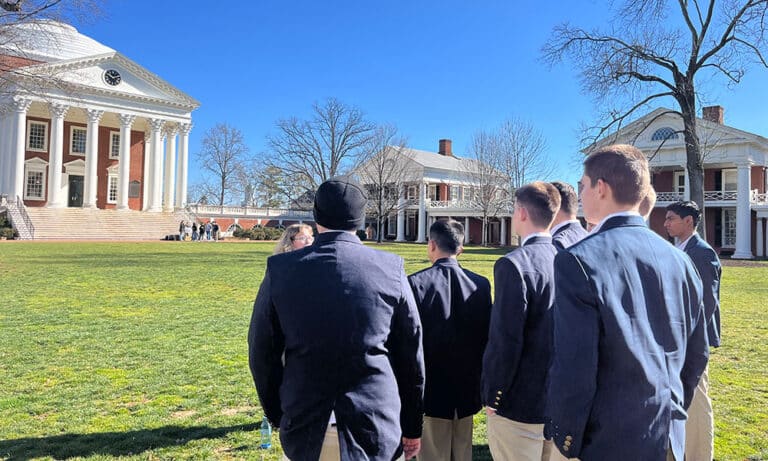 Cadets enjoy a college visit to the University of Virginia on a beautiful day.
Cadets enjoy a college visit to the University of Virginia on a beautiful day. Cadets check out operations at the Luck Stone quarry during a careers shadow day visit.
Cadets check out operations at the Luck Stone quarry during a careers shadow day visit.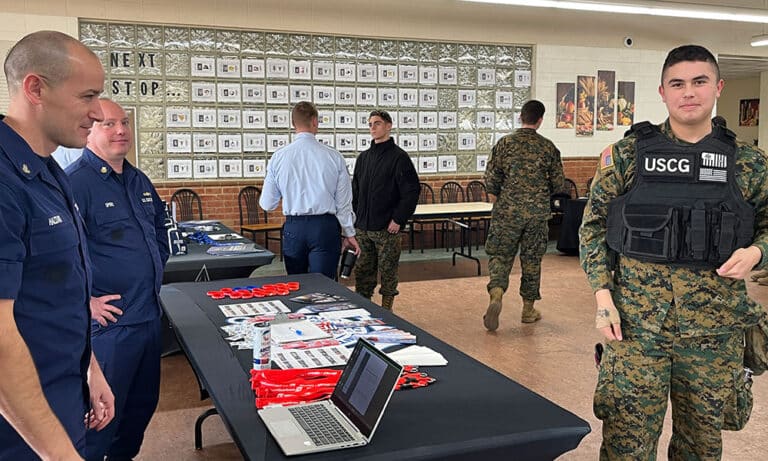 Cadets learn more about service in the US Coast Guard during a military recruiters event on the Fork Union campus.
Cadets learn more about service in the US Coast Guard during a military recruiters event on the Fork Union campus. A representative from Shenandoah University offers direct admission to a cadet during a visit to the Fork Union campus.
A representative from Shenandoah University offers direct admission to a cadet during a visit to the Fork Union campus.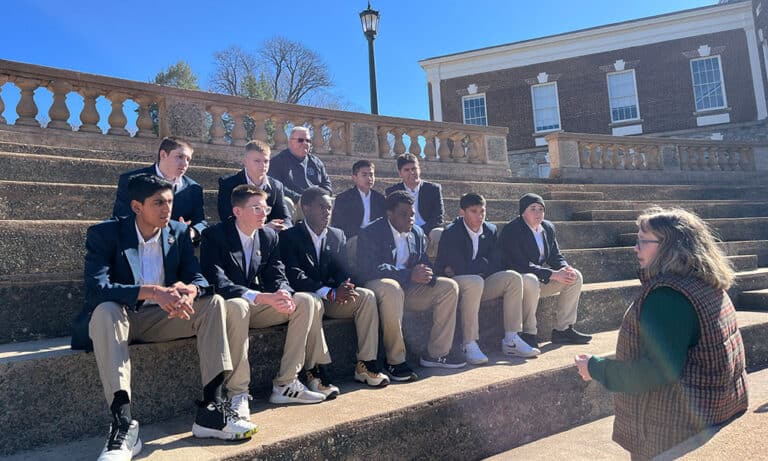 Cadets learn more about the University of Virginia during a campus visit.
Cadets learn more about the University of Virginia during a campus visit.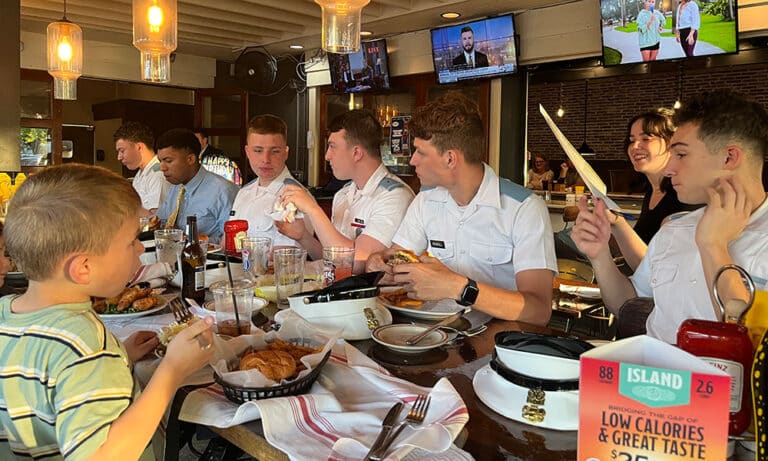 Cadets from Fork Union have dinner with cadets from The Citadel, including Fork Union alumni attending The Citadel.
Cadets from Fork Union have dinner with cadets from The Citadel, including Fork Union alumni attending The Citadel.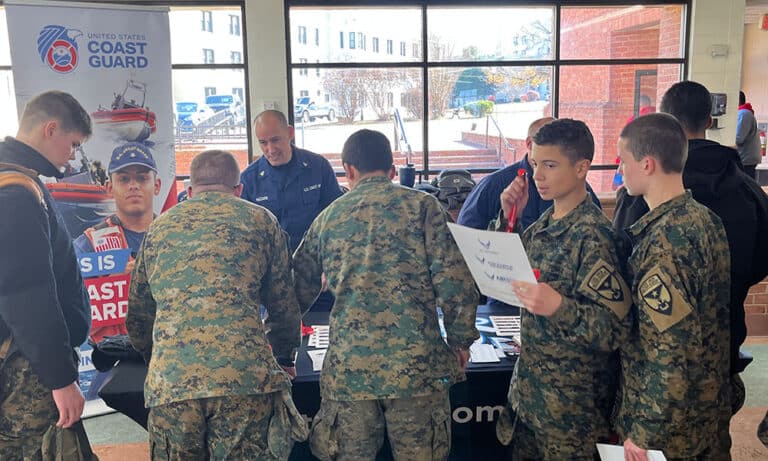 Cadets gather to learn more about the US Coast Guard as representatives make a visit to the Fork Union campus.
Cadets gather to learn more about the US Coast Guard as representatives make a visit to the Fork Union campus.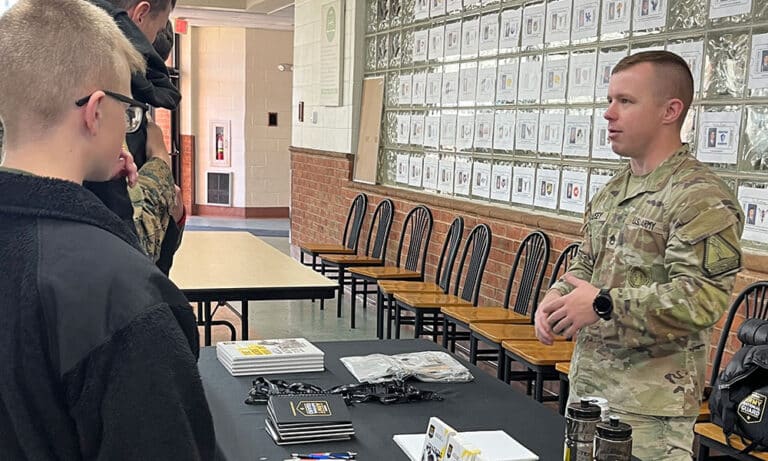 A representative of the US Army shares information with cadets on a recent campus visit.
A representative of the US Army shares information with cadets on a recent campus visit.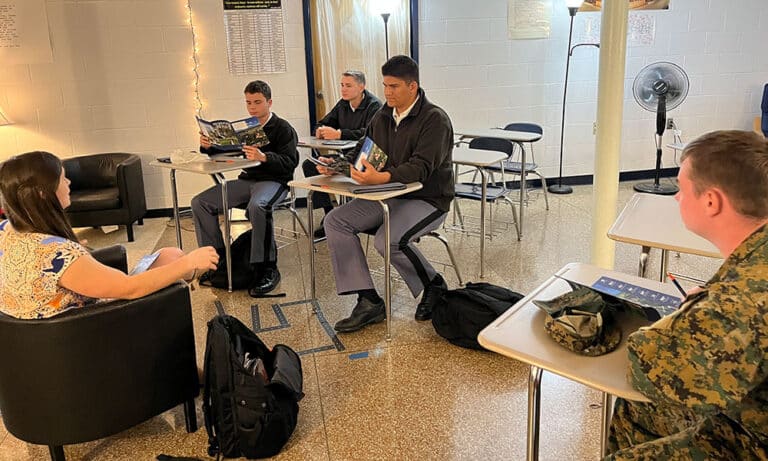 Cadets learn about Longwood University as a representative visits the Fork Union campus.
Cadets learn about Longwood University as a representative visits the Fork Union campus.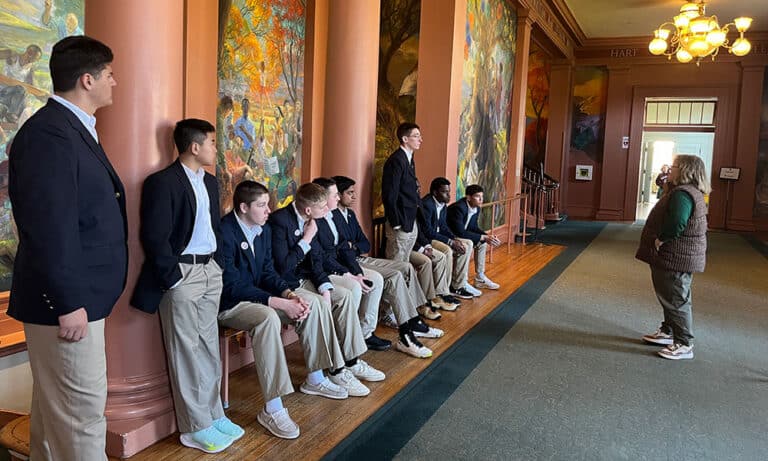 Cadets tour the University of Virginia during a college visit day.
Cadets tour the University of Virginia during a college visit day.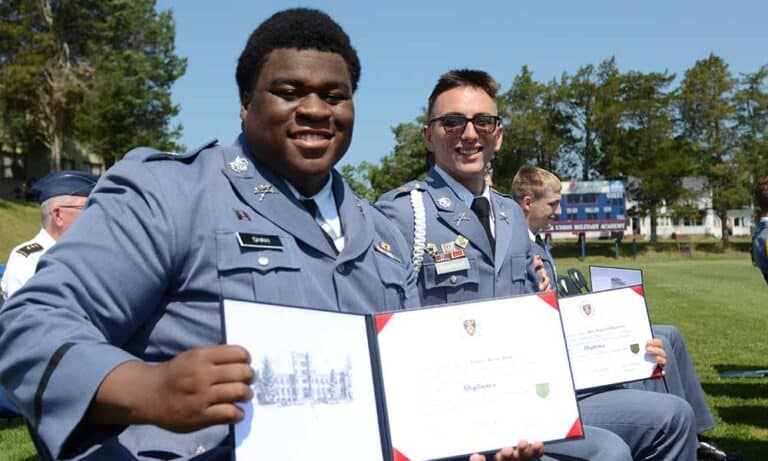 Cadets celebrate receiving their high school diplomas at Fork Union Military Academy's Class of 2023 graduation ceremony in June 2023.
Cadets celebrate receiving their high school diplomas at Fork Union Military Academy's Class of 2023 graduation ceremony in June 2023.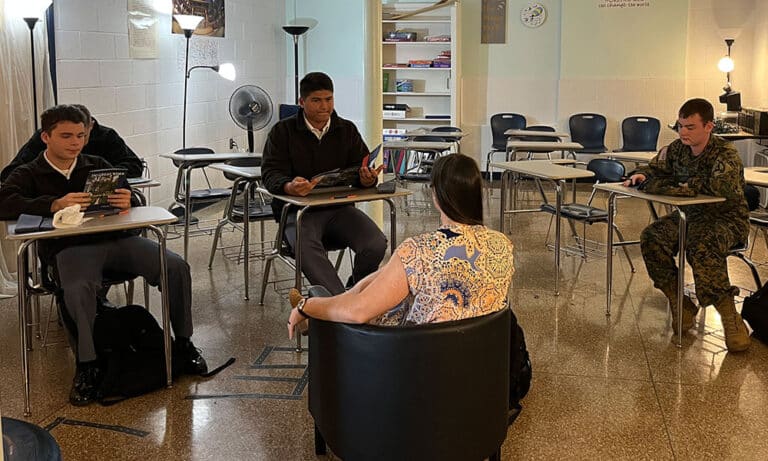 A representative of Longwood University shares information with cadets on a visit to the FUMA campus.
A representative of Longwood University shares information with cadets on a visit to the FUMA campus.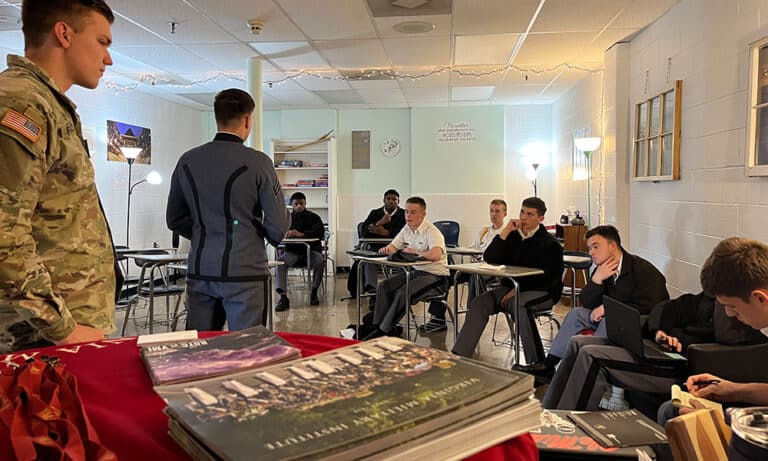 Representatives from Virginia Military Institute visit with interested cadets during a visit to the Fork Union campus.
Representatives from Virginia Military Institute visit with interested cadets during a visit to the Fork Union campus.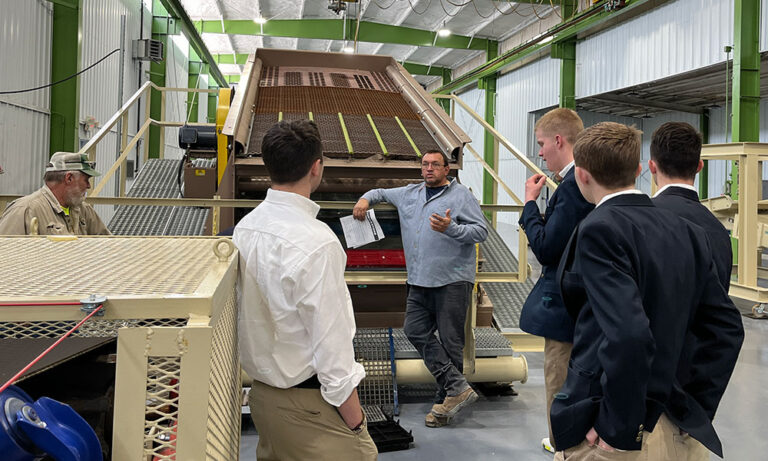 Cadets visit the Luck Stone quarry for a shadow day.
Cadets visit the Luck Stone quarry for a shadow day.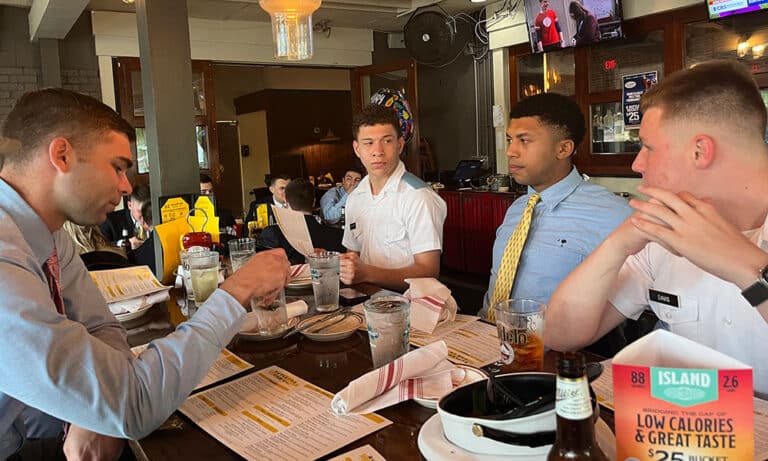 Cadets from The Citadel and Fork Union share a dinner while cadets learn more about the historic school.
Cadets from The Citadel and Fork Union share a dinner while cadets learn more about the historic school.
Academic and Extracurricular Focus
Maintaining a strong emphasis on academics and extracurricular activities is crucial. Colleges look for consistent growth and progress in students' applications from grades 9 to 11. Enroll in challenging courses but ensure you can excel in them. This is the beginning of your college journey.
PSAT/NMSQT
In October, cadets will take the PSAT/NMSQT, which serves as practice for the SAT and a chance to qualify for merit scholarships. All juniors are required to take the PSAT.
Post-High School Planning
Start considering your post-high school plans by asking yourself these questions:
· Who am I?
· What are my strengths, both inside and outside the classroom?
· What do I care about?
It’s okay if you don’t have all the answers yet. They will come with time and experience.
Spring Preparations
In the spring, start registering for the SAT or ACT, as these are standardized tests required by many colleges. Additionally, begin searching for scholarships and continue researching schools of interest and their application requirements. This is also a great time to visit college campuses and attend meetings with visiting college admission representatives, especially from colleges you may not easily be able to visit. If you are interested in Summer Leadership Programs, check for application openings and deadlines. Communicate with your college counselor.
If you’re considering military academies or ROTC scholarships, you should begin the application process the summer before your senior year.
Start working on applications over the summer.
Academic Advising
In the spring, academic advisors will meet with cadets to discuss next year's courses, ensuring they align with graduation requirements and post-high school goals.
By focusing on these areas, you will be well-prepared for the college application process and beyond.
What can parents do?
· Take a long look at your financial information and be sure you’re on the right track to pay for college. Discuss with your son the budget for attending college (this helps to create the college list.)
· Talk to your child about the schools they’re considering. Ask why those schools appeal to your child and help them clarify goals and priorities.
· Take your child to visit college campuses, preferably when classes are in session. Let your child ask the questions and do the talking.
· Make sure your child is looking into or already has applied for scholarships.
· Ask your employer whether scholarships are available for employees’ children. Parent Information from (https://studentaid.gov/resources/prepare-for-college/checklists/11th-grade)
Navigating Senior Year: Your Path to College Success
Senior year marks the beginning of many "last firsts" and can be a stressful time for students. Here’s a guide to help you stay on track:
College Applications
· Start Early: Begin your applications as soon as possible.
· Know Your Deadlines: Be aware of Early Action, Early Decision, and Regular Decision deadlines for each school.
· Finalize Your College List: Ensure your list is complete and realistic.
· Secure Letters of Recommendation: Request these early to give your teachers ample time.
· Write Your Personal Essay: Draft your essay and have an adult review it before submission.
· Take the SAT: Plan to take the SAT at least once in the fall.
· Complete the FAFSA: Submit your Free Application for Federal Student Aid to qualify for financial assistance.
· Send Transcripts: Ask your counselor to send your high school transcripts at least two weeks before the application deadlines.
Staying Organized
· Communicate with Your College Counselor: Keep them informed and seek their guidance regularly.
· Communicate with Your Family: Keep them updated on your progress and any important deadlines.
· Avoid Senioritis: Continue to work hard through graduation. Second-semester grades can impact scholarships and acceptance offers.
· Stay Involved: Maintain your participation in extracurricular activities and aim for leadership roles when possible.
Colleges review your 12th-grade year as an indicator of your continued commitment and performance. Stay focused, stay out of trouble, and finish strong!
What can parents do?
· Encourage your child to meet with the college counselor.
· Set a designated time to discuss the college process
· Encourage your child to find and apply for scholarships
· Encourage your child to prepare for college admission tests
· Offer to look over your senior’s college application
· Help your child complete the FASFA form (Federal Student Aid)
· Help your child process college responses and financial aid offers
· Help your child complete the paperwork to accept a college’s offer of admittance. Parent Information from (https://bigfuture.collegeboard.org/for-parents/action-plan-12th-grade)




